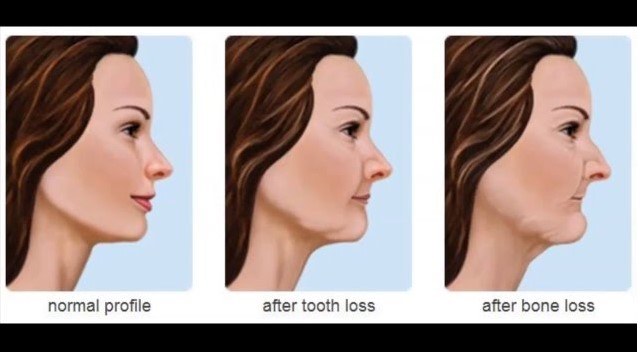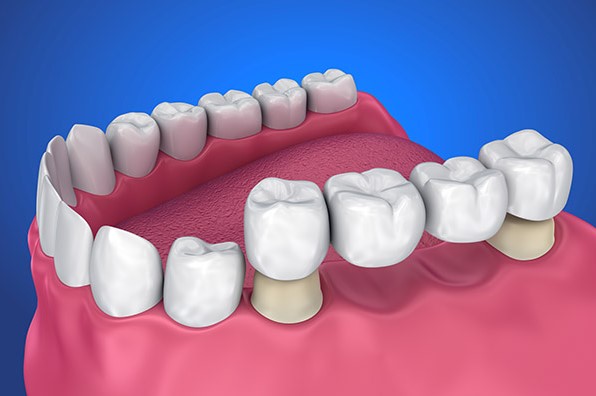In this article:
- What can happen if a missing tooth is not replaced
- Explanation of removable partial dentures, fixed bridges, and implants
- What are Tooth Replacement Options in South Jersey
- Glossary of dental terms used in this booklet
If you’re missing one more more teeth, you may be all too aware of their importance to your looks and overall health. Your teeth are designed to work together to help you chew, speak, and smile. Replacing a missing tooth (or teeth) helps to make sure that all of your teeth continue to work together. Plus, it helps protect your remaining teeth.
Here are some problems that can happen if you choose to not replace a missing tooth:
- Missing teeth may affect how you speak.
- A missing molar (back tooth) can make it harder to chew.
- When a tooth is lost and not replaced, your remaining teeth can shift.
- You may have tooth and/or jaw pain from shifted or misaligned teeth as a result of tooth loss.
- Bone loss can occur around the missing tooth. This may cause your remaining teeth to become loose over time.
- Loss of teeth and bone can make your face sag. You may look older.
Effects of a missing tooth

Facial Collapse

Replacement teeth should last for years at a time, so it’s important to choose a treatment that’s right for you. Depending on your needs, this article discusses 3 options your dentist may suggest:
- Removable Partial Denture
- Fixed Bridges
- Implants
Removable Partial Dentures (1st Tooth Replacement Options in South Jersey)
A removable partial denture usually has replacement teeth fixed to a metal or acrylic base that matches the color of your gums. The acrylic base may cover a framework made of several durable materials. Partial Dentures often have some form of clasp that attaches to your natural teeth and can easily be taken out of your mouth for cleaning or storing while you sleep.
Your dentist may also recommend crowns, or “caps,” on your natural teeth. Crowns may improve the way a removable partial denture fits your mouth.

Advantages of removable partial dentures:
- They are usually less expensive than fixed bridges or implants or when replacing multiple teeth.
- They don’t require teeth next to the space to be prepared.
- They are usually easier to repair than fixed bridges.
- They can be removed for cleaning.
Disadvantages of removable partial dentures:
- They can be less stable than other choices.
- They can break or be lost.
- They may take longer to get used to wearing because it could take several appointments for your dentist to achieve the right fit.
- Some people are embarrassed to take out their teeth at night and for cleaning.
- They may need more frequent replacement than implants or a fixed bridge.
Fixed Bridges (2nd Tooth Replacement Options in South Jersey)
A fixed bridge is a restoration that fills the space where one or more teeth have been lost. A fixed bridge is permanently bonded or cemented into place -this means that only a dentist can remove it.

Advantages of fixed bridges:
- They can look, feel and function like natural teeth.
- They don’t require removal for cleaning.
- They may cost less than implants.
Disadvantages of fixed bridges:
- They affect the teeth next to the missing tooth – once they are prepared for placement of the bridge, they will permanently lose their natural look and shape.
- They my require extra effort to clean under the replacement tooth (called the pontic)
- They are likely to be more expensive than a removable partial denture.
Placing a bridge usually takes more than one dental visit. On your first visit, your dentist prepares the teeth on either side of the tap. The bridge will later be attached to these teeth.
Implants (3rd Tooth Replacement Options in South Jersey)
Implants are posts (metal “roots” that are surgically placed in your upper or lower jaw, where they function as a sturdy anchor for replacement teeth. They are made of titanium (a strong, lightweight metal) and other materials that are accepted by your body. Many people choose implants to replace a single tooth, several teeth, or to support a full set of dentures.

A dental implant may be right for you if you:
- wear dentures that are uncomfortable
- are not happy with your removable partial dentures
- want to keep your other natural teeth unchanged
Most people find that an implant is a good replacement for their missing tooth because it’s secure and stable.
A tooth implant is a surgical procedure, so it’s not an option for everyone. You may be a good candidate for an implant if you:
- are in good overall health
- have adequate bone to support the implant, or be able to have surgery to build up the area needing the implant
- are ready to commit a daily oral care routine and to regular dental visits
If you have a chronic illness like diabetes or high blood pressure, you may not be a good candidate for implants because it can take you longer to heal after surgery. Drinking alcohol and using tobacco or e-cigarettes can also slow healing. Your dentist can help you decide if implant treatment is a good option for you.
Advantage of implants;
- An implant is most similar to a natural tooth and often feels more comfortable.
- Nearby teeth remain unchanged and do not have to be involved in the placement procedure.
- They are a good value because they can last a lifetime with good care.
- They may help prevent shrinkage of the jawbone from tooth loss.
- They may fit better and be more comfortable than removable partial dentures.
Disadvantage of implants;
- They require a surgical procedure to place them.
- Implant placement may take longer and may require more dental visits than other options.
- They may cost more than other treatments.
Dental Dictionary
Here is a list of word that were used in this article. Your dentist may refer to these terms when he or she is discussing treatment plan with you.
Attachment tooth/teeth: The prepared teeth on either side of the gap that hold the fixed bridge in place
Bridge: A tooth replacement option that fills the space where one or more teeth are missing by permanently connecting a replacement tooth or teeth into place.
Crown: A “cap” that is either placed over attachment teeth as part of a fixed bridge or placed over an implant itself to serve as a new tooth replacement.
Partial Denture: A tooth replacement option in which the replacement teeth are fixed to a metal or acrylic base. It has clasps that attach to your natural teeth to hold the denture in place and is removed daily to be cleaned and while sleeping.
Implant: A tooth replacement option in which a metal post is surgically placed in the upper or lower jaw bone and acts as a support for a replacement tooth or teeth.
Talk to Your Dentist regarding Tooth Replacement Options in South Jersey
You can get answers to your questions and together you can decide which option will work best for you.: removable partial dentures, fixed bridges, or implants. Rapha Dental is located in Route 130 of Burlington County. Call us today at 856-829-8668 or contact us to schedule an appointment.

